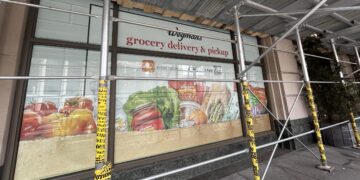By Emily Yourman
The city is treating its composting program like garbage, and many New Yorkers won’t stand for it.
Upper West Siders and others throughout the city have come together to reinstate funding for composting after extreme budget cuts due to Covid-19. The Department of Sanitation halted organics pick-up on May 4th, and the budget for Fiscal Year 2021 (which starts July 1) removes all funding for The Compost Project and Grow NYC’s Zero Waste Program. A petition on change.org to reinstate composting in NYC has already received over 19,000 signatures. And a group called #saveourcompost has been encouraging people to contact their council members to agitate for more funding.
Environmentally conscious members of the community are now composting at home using indoor bins with worms or outdoor bins, traveling outside the city to dispose of their food scraps, or blending their food scraps to place in tree beds. Grow NYC has a list of options here. However, many do not have the resources to compost without the city’s program; the best they can do at the moment is minimize their organics waste.
“We used to always compost at the green market,” said Jeff Twine, president of Upper West Side Recycling, an organization that sends out a bi-monthly newsletter related to environmental activism in upper Manhattan. Twine testified at a city council hearing on June 15th in favor of reinstating funding and the Community Organics and Recycling Empowerment (CORE) Act, along with many other New Yorkers. They are waiting until June 30th to hear the City Council’s response on the budget, but will have to wait much longer to hear about the future of the CORE Act.
In 2019 DSNY collected a daily average of 307,000 pounds of organics for composting, and was showing promise of collecting even more in 2020. Now that the program has been cut, the waste is either shipped to a removal center and burned or dumped in a landfill–most of which are located near low-income communities. Food scraps left to degrade in landfill release large quantities of methane. By contrast, composting does not release any methane if it’s done properly. Methane is a large contributor to climate change; it has a comparative impact 25 times greater than that of carbon dioxide. Cutting the program has also taken away the supply of compost that many New Yorkers use in volunteer gardens and tree beds.
The Compost Project and Grow NYC Zero Waste Program provide food scrap drop-off sites, community composting facilities, and environmental education resources. The Compost Project funds community composting facilities such as Earth Matter NY, Lower East Side Ecology, and Big Reuse. In addition, it provides compost distribution and 170 food scrap drop-off sites. The two programs relied on $7 million of funding from the New York City budget, and community members are lobbying to get that funding back.
In addition to the push for reinstating funding, New York City Council members have introduced the CORE Act, which will provide 177 Community Recycling Centers across the city operating 20 hours a week.
According to New York City Council Member Keith Powers, the act aims to “reinstate, preserve, and expand New York City’s composting program.” Ideally, Powers would like to see composting bins in every building “creating a ‘no excuses’ scenario,” and for the city to have mandatory curbside composting. For now, he is working with New York City Council Member Antonio Reynoso and fellow New Yorkers to get the composting program running again.
Many are hoping the immense amount of support for composting will push the funding to be reinstated. With its impressive number of signatures, the change.org petition aims to provide “ammunition to persuade those who might be on the fence,” said Sarah Gallagher, founder of Upper Green Side, a local non-profit that encourages action and awareness on environmental issues. She also adds that the amount of signatures has been impressive for an “utterly grassroots” effort.









It’s such a disappointment our elected leaders decided to cut support to these local non-profits doing amazing work for us all from the budget. While we all understand belt tightening is needed, certain line items are strategic investments in our future, this is one. Composting infrastructure and habits that have taken years to build will be destroyed overnight, throwing away millions of dollars of previous spending and increasing future costs to relaunch – a shortsighted choice that is the definition of penny wise, pound foolish.
I hope all will reach out to their reps in the coming days to let them know the community needs these important programs.
Congratulation UWS Composter — You have said it all,& put it very well.
When my building ended composting, I was so disappointed that it had been ended at the Greenmarket as well.
Organic material is heavy. Diverting it out of the waste stream actually saves more than the program costs. It’s a job creator. Composting makes sense ecologically and economically. Bring it back!
Progressives aren’t environmentalists apparently.
Our earth and our communities need composting! This is vital and necessary. Only good comes from composting so it should get funded!!
Well, if you are going to totally shut down the state economy for 3 months something has to give way due to extreme budget constraints OR you have to raise taxes to make up for 3 months of shortfalls. It’s just simple math.
We elect politicians to make those choices for us. If you don’t like their choices vote them out (as if that is ever going to happen around here).
Maybe Central Park could start a compost program as it makes great fertilizer.
Good hear and thanks for sharing the link to the petition!
I signed that petition along with 19,000+ so far. It’s easy to do and though many petitions just make you feel good, I think this one may actually be effective!
At the very least we need somewhere to bring our smelly compostable materials so they can be turned into rich earth. So put that $7 million back into the budget, dear council members and Mr. Mayor!
The CORE Act would be good too but will take longer to put in place. It does remind me of schlepping cans and bottles over to Goddard Riverside decades ago. I’d be glad to schlepp, much better than throwing this valuable resource in the trash!
I’ve long been a supporter of composting (as well as a bit of a cynic). The article states that in 2019, over 300,000 pounds of organic material was collected DAILY. I’ve never been able to find out where the compost that resulted from this actually ended up. One would have expected this to go to farms, parks, gardens, etc. but I am not aware of evidence of this. I know that during this period some DOS people were seen to dump paper meant for recycling into their trucks together with regular garbage. Does anyone have any evidence of what actually happened to the compost material?
It depends where/who collects it. GrowNYC Greenmarkets go to one of the several community sources mentioned here depending on borough. I have been to EarthMatter on Gov’s Island and can attest it is composted (well, some was fed to hungry chickens and goats…). Staten Island DSNY compost makes its way to The Staten Island Compost Facility is located at 450 West Service Road, Staten Island, NY 10313 (Route 440 South, Exit 7, Victory Blvd) (you can visit for OpenHouse NY!) I believe some goes up to a site in Danbury and on occasion some ends up at the Newtown Creek WWTP where it is digested into renewable natural gas. Finished compost makes its way to landscapers, community gardens, and is even redistributed at the farmers markets. Buy local food, drop off the left overs, and pickup the compost. Full loop!
Thank you UWScomposter, My faith has been restored!
If building sewage pipes could handle it, installing food processors in kitchen sinks would be great. It’s cheaper, uses existing infrastructure, and decreases the use of garbage trucks.
Will composting save money in the long run? What are the costs for waste hauling to landfill? And, if we move away from disposable a bit, reducing those costs may save enough to wash out the current costs of composting, and ultimately drive real savings.
Please make sure that composting is funded for NYC..
UWS, please call Helen Rosenthal today in support of funding community composting! (212) 873-0282
More information at SaveOurCompost’s Instagram and Twitter pages:
http://www.instagram.com/saveourcompost/
twitter.com/SaveNYCCompost
Love composting! All for it. But “blending their food scraps to place in tree beds” seems to be an invitation to rats.